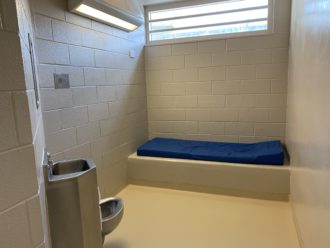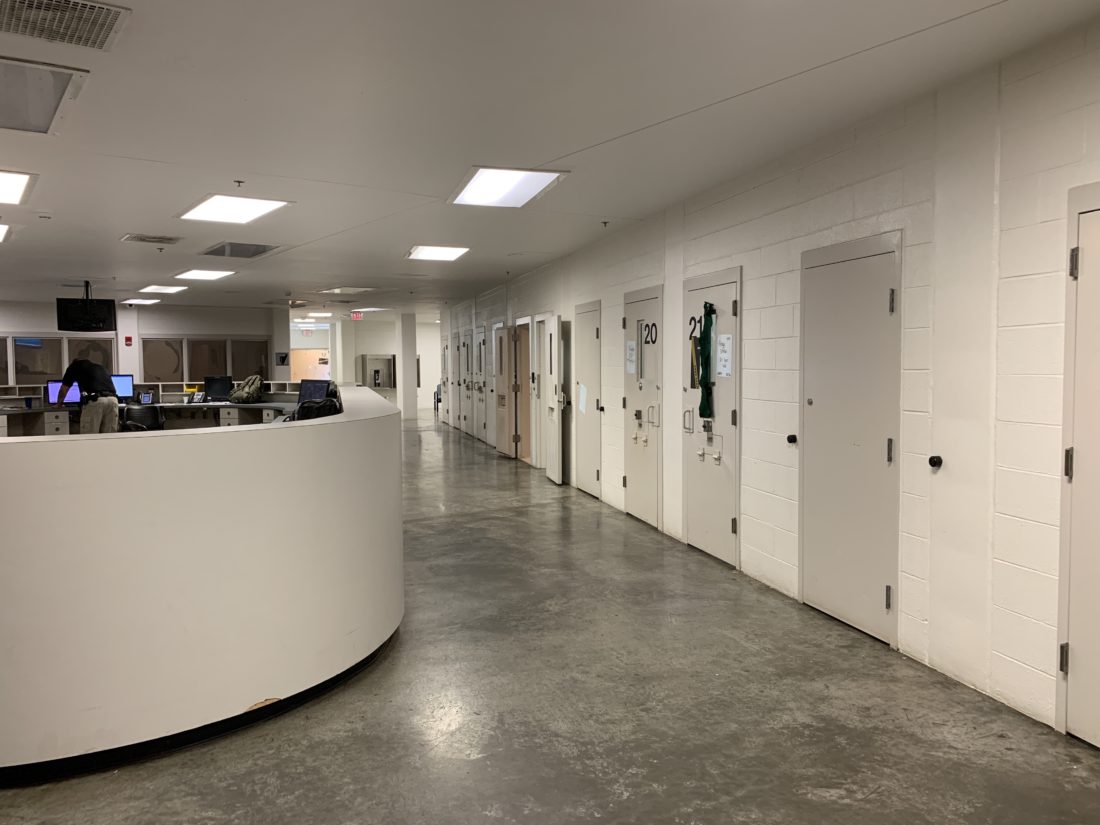Tiffany Watson was handed a COVID-19 test that looked “like a tube of lipstick.” She was told to swab the left side of her mouth seven times, then swab seven times on the right. Then, she was brought to a cell at the Buncombe County Detention Facility for two weeks of medical quarantine.
She sat in the cell, alone, for 14 days. Meals were delivered through a hole in the door, she says. Every three days, she was allowed to take a shower.
On the 15th day, an officer came to Watson’s door, took her temperature and asked if she was experiencing any symptoms of COVID-19. She answered no, and just like that, her isolation was over.
“It’s honestly hard to think about it,” she reflects. “I sat there for 14 days and then was asked a few questions that didn’t take that long.”
Watson spent over three weeks at the Buncombe County Detention Facility before she was released on bail on June 8. A statewide mandate has prompted COVID-19 testing for all incarcerated individuals in state prisons, but local jails — Buncombe’s included — aren’t obligated to test everyone in custody. Instead, facilities have been directed to mitigate spread of the coronavirus through screening, isolation and social distancing.
“Courts have said that people who are incarcerated have a right not to be confined in conditions where they are likely to contract a serious illness,” explains Ian Mance, a legal resource associate at the UNC Chapel Hill School of Government studying COVID-19 and the criminal justice system. “But crafting an order that makes that happen in the real world is difficult.”
Matter of state
When COVID-19 emerged as a serious threat, health experts warned that state-managed prisons and county-run jails would become hot spots for infection. An April 22 report by the American Civil Liberties Union predicted jails, which house approximately 737,900 Americans on any given day, would act as vectors for infection in their surrounding communities.
As of July 17, 11 correctional facilities in North Carolina were reporting current ongoing outbreaks of COVID-19, resulting in 65 cases, according to data released July 17 by the N.C. Department of Health and Human Services. Since March, NCDHHS has reported 1,966 total COVID-19 cases and 31 deaths in federal, state and county correctional facilities.
The N.C. Department of Public Safety announced in late June it would begin testing the roughly 31,200 individuals incarcerated through the state prison system for COVID-19, an undertaking that will cost the state roughly $3.3 million. However, the mandate does not apply to county-run jails and detention centers, which are maintained by local sheriff’s departments.
County facilities are following guidance released by NCDHHS and the federal Centers for Disease Control and Prevention, explains Capt. Glen Matayabas, who oversees the Haywood County Detention Center. Anyone entering a detention center is asked about their close contacts with COVID-19 patients and screened for fever and other symptoms.
The NCDHHS guidelines state that all newly arrived inmates must then be placed in quarantine until 14 days have passed since their arrival, ideally in single cells with solid walls and solid doors. Once transferred to the general population with other inmates, individuals are expected to maintain 6-foot social distancing when possible.
A legal perspective
If the government is going to incarcerate someone, it must take reasonable care to keep them safe, Mance says, regardless of whether they’re held in a state prison or county jail. Unfortunately, it’s often hard to tell the difference between medical quarantine and the more punishing practice of solitary confinement.
“Medical quarantine can be a reasonable step to keep people who have been exposed to infectious disease safe and to keep other people safe,” says Daniel Siegel, an attorney with the ACLU of North Carolina who studies solitary confinement. “At the same time, there is a world of difference between medical isolation and solitary confinement, which is inherently punitive.”
The dangers of solitary confinement aren’t a recent revelation, Siegel explains. A growing body of research confirms that locking someone in a small cell for 22-24 hours a day with limited opportunity for human contact causes serious mental and physical harm. The practice can lead to extreme anxiety, depression, recurring mental illness, cardiovascular disease and heightened risk of suicide, he says.
The ACLU of North Carolina, N.C. NAACP and Disability Rights North Carolina sued Gov. Roy Cooper and NCDPS Secretary Erik Hooks in April to “ensure that no person incarcerated in North Carolina state prisons is subject to cruel and unusual punishment” as a result of COVID-19. In a preliminary injunction, Superior Court Judge Vinston Rozier made clear that medical quarantine should not have the same features as solitary confinement, including isolation in a locked cell, restriction of phone calls and limits to recreational, religious, educational or vocational activities.
But from what Siegel has seen at the state level, medical quarantine often looks almost exactly like solitary confinement. Correctional officers use the same cells, the same limitations on human contact, the same limitations on exercise. The practice also discourages those in custody from reporting COVID-19 symptoms or possible exposure for fear they’ll be locked in a small cell for 14 days, he adds.
The Department of Prisons is working to comply with the order, says John Bull, a NCDPS spokesperson. Due to the ongoing litigation, he did not comment on any changes to medical quarantine conditions, but did note that all organized religious, educational and vocational activities have been temporarily suspended in all state prisons.
Playing it safe

At the county level, local detention center administrators say they’re following the spirit of medical quarantine as a way to slow viral spread, not punish inmates.
“This is absolutely not punitive isolation,” emphasizes Jeremy Queen, division commander for detention at the Transylvania County Sheriff’s Office. “Quarantine is simply being held in a different location away from the general population.”
At the Buncombe County Detention Facility, which books and releases more than 1,000 people each month, detainees are only tested for COVID-19 if they show symptoms or have been exposed to a confirmed case, says Aaron Sarver, spokesperson for the Buncombe County Sheriff’s Office. With new people entering the facility each day, jail administrators are “constantly evaluating” the best practices to slow the spread of COVID-19.
“Unfortunately, this virus has shown an ability to stay asymptomatic in carriers, and in order to best protect the entire facility, the only way this could be accomplished was to initiate a 14-day quarantine,” Sarver says. “Although not ideal, this policy has prevented our facility from having any COVID-19 infections so far.”
While in quarantine, detainees are allowed books, video visitation, phone calls and access to the courts, as well as nursing and mental health services as needed, Sarver says. But Watson says her experience at the Buncombe jail didn’t completely match that policy.
Although Watson was allowed one book and took two phone calls during her medical quarantine, she says she wasn’t allowed to purchase anything from the facility’s commissary, nor was she offered mental health services. The whole time, she was worried about her health — she has a weakened immune system due to several medical complications and says her health worsened significantly while in custody.
The Madison County Detention Center conducted baseline COVID-19 testing for everyone in custody, including the population housed at the onsite Madison County Juvenile Detention Center, in early June, says Michelle Quintero, the jail’s administrator. The facility now offers COVID-19 testing for anyone entering custody, but individuals must still complete the full 14-day quarantine regardless of test results.
A better way?
A number of courts have recently written about how difficult it is to fashion orders that adequately protect incarcerated people from COVID-19, Mance says. It’s essentially a math problem, he argues: There are too many people in state and county facilities to appropriately distance everyone in custody.
Quintero agrees. The adult population at the Madison County Detention Center lives in four-person cells where it’s physically impossible to stay 6 feet apart, she says.
“If people weren’t being arrested every day, and we had the luxury of space, we would put fewer people in a cell in the housing unit,” she says. “But we don’t have that luxury.”
To get to the core of the problem, Siegel hopes to see a decrease in North Carolina’s incarcerated population.
“Really, regardless of what policy you adopt, if you have a crowded facility where it is physically impossible to social distance and you have a shortage of masks, then the other policies you adopt are only going to do so much good,” Siegel says. “The bottom line is, if you can’t provide humane conditions of confinement, then you can’t keep human beings there.”




Before you comment
The comments section is here to provide a platform for civil dialogue on the issues we face together as a local community. Xpress is committed to offering this platform for all voices, but when the tone of the discussion gets nasty or strays off topic, we believe many people choose not to participate. Xpress editors are determined to moderate comments to ensure a constructive interchange is maintained. All comments judged not to be in keeping with the spirit of civil discourse will be removed and repeat violators will be banned. See here for our terms of service. Thank you for being part of this effort to promote respectful discussion.